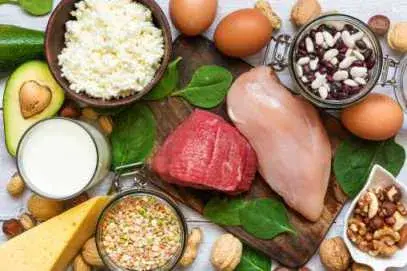Benefits of Protein

Benefits of Protein - Major of Protein Sources
Protein is a fundamental nutrient for the human body, serving as the building block for tissues and functioning as a primary fuel source. Derived from the Greek word protos, proteins play a vital role in maintaining and rebuilding tissues and cells. They are an essential component of any diet, especially when aiming for muscle growth and overall health.
Understanding Protein Functions
Proteins are not only crucial for muscle development but also for other essential functions, including transporting molecules, regulating water balance, acting as enzymes, and serving as structural units in the body. From liver cell membranes to keratin in hair and nails, proteins are indispensable for life.
While lifting weights alone cannot make you stronger, a diet rich in protein rich foods is necessary for muscle repair and growth. The best part is that there are plenty of options for protein rich food in veg diets too. Workouts without equipment are beneficial for all fitness levels, but pairing them with protein rich food in veg can amplify the results significantly.
Proteins are classified into two major categories:
1. Essential Amino Acids:
These cannot be synthesized by the body and must be obtained from protein rich foods, including protein rich food in veg sources like soy, lentils, and chickpeas.
- Methionine
- Tryptophan
- Valine
- Isoleucine
- Leucine
- Phenylalanine
- Lysine
- Threonine
- Arginine
- Histidine (only for infants)
2. Non-Essential Amino Acids:
These can be synthesized within the body. However, supplementing your diet with protein rich food in veg ensures you're meeting your daily protein requirements.
- Glutamic acid
- Proline
- Glycine
- Alanine
- Hydroxyproline
( For Making Your Career in fitness industry Here... )
Proteins can be categorized based on their amino acid profile, affecting their nutritional value. Higher quality protein rich foods promote growth and repair, which is essential for maintaining good health.
- Complete Proteins: These provide all essential amino acids. Examples include protein rich food in veg like quinoa and soy.
- Partially Complete Proteins: These lack one or more essential amino acids but still contribute to a balanced diet when combined with other protein rich foods.
- Incomplete Proteins: These do not promote growth as effectively but can still be beneficial when eaten in combination with other protein rich food in veg options.
Function of Protein:-
- Tissue Growth and Maintenance: Protein is the primary building block for muscles and tissues. Including protein rich foods such as lentils and tofu, particularly protein rich food in veg, is crucial for muscle maintenance and growth.
- Transportation of Compounds: Amino acids in proteins assist in the transportation of molecules, making processes in the body more efficient.
- Water Regulation: Proteins like the Anti Diuretic Hormone (ADH) control water balance in the body. Adequate intake of protein rich foods supports these functions.
- Enzymatic Functions: Proteins act as enzymes, helping speed up biochemical reactions, while protein rich foods ensure you have the necessary building blocks for these processes.
- Structural Units: Proteins form structural units like keratin in hair and skin. Including protein rich food in veg helps maintain healthy tissue structure.
Recommended Dietary Allowance (RDA) for Protein :-
To meet daily protein needs, it's essential to follow the Recommended Dietary Allowance (RDA). A healthy individual should consume about 1 gram of protein per kilogram of body weight. This can easily be achieved through protein rich foods, including protein rich food in veg options like beans, lentils, and quinoa.
Protein Quality: Biological Value
The biological value of protein measures how efficiently the body utilizes protein for growth. Protein rich foods are rated on a scale where 100 represents the most efficient sources.
- Whole egg 93.7
- Milk 84.5
- Fish 76
- Beef 74.3
- Soyabean 72.8
- Rice polished 64
- Wheat, whole 64
- Corn 60
- Beans, Dry 58
The Effects of Protein Imbalance
Both excess and deficiency in protein intake can have adverse effects. While protein rich foods are vital, consuming too much protein (over 250-300 grams per day) can lead to issues like bone loss and kidney stones. It's crucial to balance your diet with the right amount of protein rich food in veg and other nutrient-rich foods.
Deficiency in protein, particularly in children, can lead to Protein Energy Malnutrition (PEM), causing conditions such as Marasmus and Kwashiorkor. These conditions have severe signs like tissue wasting, edema, and liver enlargement.
All these diseases has signs and symptoms like:-
- Curly hair
- Odema on body
- Protuding belly
- Enlargement of liver
- Tissue wasting
- Hunger
- Gross weight loss
This kind of childen who has PEM they need spcial care and norishment. As their digestive tract and protein absorbstion system is bery less active feeding them with lots of good quality food would be harmful.One must gradully increase the amount of nutrient in their food and give sufficient time to devlope matabolic pathways to handel a better diet.
Guides
- Benefits of Protein
- 7 Healthy Eating Habits
- 7 Most Effective Exercises At Home
- Home Workout Plan Without Equipment
- Top 10 Biggest Nutrition Myths
- How To Get Flexible Body?
- Weight Loss VS Fat Loss
- What is Keto Diet?
- What Is Minerals?
- What Is Digital Marketing ?
- Best Free Tools For Beginner You Tubers
- Best Teas For Weight Loss & Fat Burning
- Green Tea: Health Benefits And Side Effects
- Yoga for Weight Loss and Fat Burning
- What Is Type-2 Diabetes?
- How To Write Eye-Grabbing Resume
- The Ultimate Guide To Prepare For An Interview
- 10 Best Health Benefits Of Eating Mango
- healthy eating habits for kids
- 10 tips for starting your Fitness Transformation
- 10 Reasons Why People Hate Gym & How to Overcome Them
- Fuel Your Passion For Nutrition: Explore The Power Of A Nutrition Course
- Shed Pounds with Ease: Vegetarian Diet Plan for Weight Loss Revealed!
- Anabolic steroids: Types, Uses, and Side Effects
- Find Your Path to Success: Choosing the Right Fitness Certification Program in India
- learn gym trainer course offline at surat with best faculties
- Learn about Body Composition and How it Affects Your Health
- Nutrition course online with affordable fees
- Online Dietitian Plan vs In-Person Consultation: Which is Right for You?
- The Importance Of Fitness Education In Today's World


About Dr.Gautam Jani
Dr. Gautam is a civil engineer. By passion he is a dietitian and had started practising it in the year 2016. He is the founder of fitnesswithgomzi firm established in 2018. He has achieved many certificate from ACSM, ISSA and VLCC.

